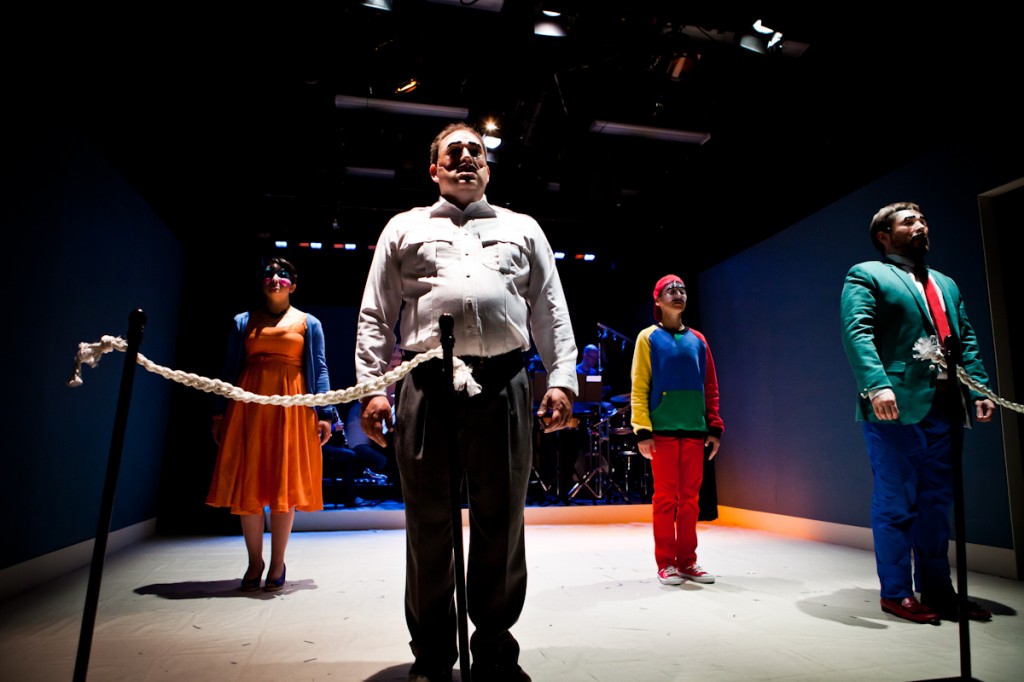Compelling premiere shines a modern light on Persian poet at Boston’s Guerilla Opera

Aliana de la Guardia, Brian Church, Jennifer Ashe, and Jonas Burdis in Guerilla Opera’s world premiere of Adam Robert’s “GIver of Light.” Photo: Stephanie J. Patalano
Rumi seemed to have it all.
Son of a well-to-do Persian theologian and mystic, he would go on to become, by the mid-thirteenth century, an influential scholar and teacher of Sufism.
But a chance meeting with an outsider, Shams of Tabriz, forced a middle-aged Rumi to engage the world as he never had before, through direct experience. Though their ensuing friendship, according to legend, was a source for bitter jealousy in Rumi’s family, it was Shams’ spiritual guidance that drove Rumi to craft his beloved mystical poetry that lives on today. In verse, the poet even referred to his friend as a radiant star, the bringer of God’s light into his life.
It may seem like an unlikely idea for an opera, but Rumi’s story is the source for Adam Roberts’ Giver of Light, which Guerilla Opera premiered at Boston Conservatory’s Zack Box Theater Thursday night.
Cast in two slick acts, Giver of Light is a challenging and moving tale of misunderstanding and loss. Set in present day America, Roberts’ libretto recasts the Persian poet as John, a Fresca-drinking hybrid car salesman caught in a midlife crisis. His success and family—wife Elena and son Brian—do little to make him happy, and he seeks deeper meaning to life. John finds it in Darren (Shams), a school bus driver well-versed in mysticism and meditation.
Their friendship, over time, alienates Elena. She is distraught when John resists her sexual advances, and her fear that John and Darren may be having a homosexual affair ultimately clouds her better judgment. Still, she’s far from the villain in this story. In fact, there are no villains, heroes, or simple answers offered to the problems the characters face.
The drama’s raw emotion is enhanced by Roberts’ music, which contains an attractive mix of the familiar and exotic. An ensemble of clarinet, saxophone, cello, percussion, and electronics combine jazzy and disjointed melodies into a sparkling collage. Squeaking clarinet, scratching cello, and shimmering electronics provide an effective soundtrack to John and Elena’s ongoing emotional crisis. The opera’s vocal lines are cast in an accessible conversational style. But for the meditation scenes, Roberts’ vocal writing becomes otherworldly, where the undulating vibratos and throaty tones of Middle Eastern chant mix with a wash of electronics for a haunting and beautiful effect.
A small cast of fresh-faces offered fine singing and stage presence. Jonas Budris’ dynamic and sweet-sounding tenor voice was well suited for John’s wide emotional range. Tenor Brian Church was equally expressive for the more stately and controlled Darren. The two achieved a particularly supple blend for their meditation scene.
But the vocal highlights of the evening came from the female roles. Soprano Aliana de la Guardia performed a fluent and powerful Elena. And Jennifer Ashe’s soprano rang clear in the smaller roles as Brian and Susan, Elena’s friend. Together, Budris and de la Guardia made the tension between husband and wife and palpable. Their unbalanced vocal blend, where the soprano occasionally drowned out Budris’ more subdued singing, was the only weakness in their performance.
Some inventive staging helped fill the plot’s dead spots. For the meditation scene, black lights illuminated Arabic script etched on the set walls and stage floor. And for points of exposition, the singers doubled as a Greek chorus, donning masks of clear plastic that were painted with Vendetta-like eyebrows and mustaches.
The props of table, chairs, and throw pillows demonstrate how complicated and subtext-riddled stories like this one can be told through the simplest of means. In the end, the listener is left to ponder the opera’s incipit, a Rumi verse directed at everyone: “If we would taste one sip of an answer, we could break out of this prison for drunks.”
Giver of Light will repeat 8 p.m. Friday, Saturday, May 30 and 31. 617-912-9222; guerillaopera.com